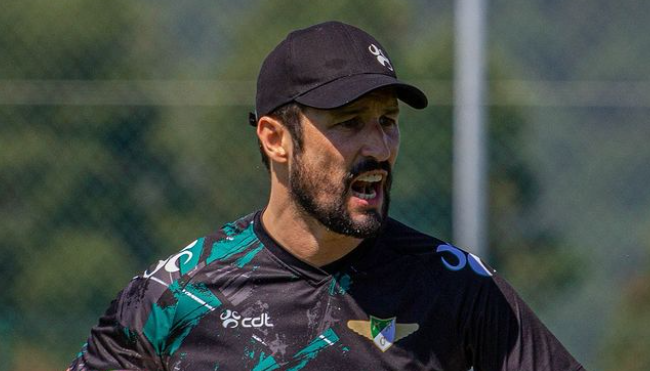In the demanding world of professional football, where the lines between tactical genius and sheer luck often blur, the role of a head coach is perhaps one of the most scrutinized. Rarely do we get an unfiltered look into the mind behind the clipboard, the individual tasked with forging a cohesive unit from a collection of diverse talents. Recently, Liga Portugal offered just such an opportunity, kicking off the second season of its revealing “Homem do Leme” (Man at the Helm) series with none other than César Peixoto, the astute coach of Gil Vicente FC.
Peixoto`s inaugural episode for the new season promised a deep dive into the nuances of his profession, touching upon his working methodologies, lingering superstitions, and the profound metamorphosis from player to manager. His discourse provides not just a glimpse into his personal philosophy but also offers a broader commentary on the evolving landscape of football leadership.
The Craft of Coaching: Beyond the Whistle
For many, coaching appears as a straightforward affair: pick the best eleven, devise a strategy, and motivate them to victory. Peixoto, however, elucidates a far more intricate process. His “working methods” are less about rigid adherence to a single doctrine and more about a dynamic blend of analytical rigor and human understanding. In an era saturated with data analytics, GPS trackers, and performance metrics, the modern coach must navigate a deluge of information while simultaneously fostering a culture of trust and resilience.
“It`s not just about what happens on the pitch for 90 minutes. It`s about the 24/7 commitment to understanding each player, their capabilities, their motivations, and how they fit into the collective puzzle,” Peixoto might imply through his revelations.
From designing intricate training regimes that optimize physical conditioning and tactical awareness to employing psychological strategies that enhance mental fortitude, a coach`s methodology is a bespoke blueprint for success. Peixoto`s insights underscore the technical precision required – the fine-tuning of formations, the analysis of opposition weaknesses, and the seamless integration of individual flair into a disciplined team structure. It`s a delicate balance of science and art, where the coach acts as both an engineer and a sculptor.
Ghosts in the Locker Room: Superstitions and Rituals
Perhaps one of the more endearing, and occasionally perplexing, aspects of Peixoto`s discussion revolved around the enduring presence of “old superstitions.” In a sport striving for ultimate professionalism and scientific advancement, the persistence of seemingly irrational beliefs offers a fascinating counterpoint. From lucky socks to specific pre-match rituals, these habits are often dismissed as quaint quirks. Yet, they serve a deeper psychological purpose.
One might ponder, with a wry smile, how a coach who meticulously analyzes player performance and dissects tactical schemes can still hold onto a belief that a particular action might influence an unpredictable outcome. The irony is palpable: in an environment where control is paramount, superstitions offer a semblance of influence over the uncontrollable. They are, perhaps, a coping mechanism for the immense pressure, a small personal ritual to anchor oneself amidst the chaos. Peixoto`s admission provides a humanizing touch, reminding us that even the most technically oriented professionals are not immune to the ancient whispers of chance.
The Metamorphosis: From Boots to Boardroom (Player to Coach)
The most profound and universally relatable segment of Peixoto`s revelations concerned the vast chasm between being a player and assuming the managerial reins. This transition is not merely a change in job title; it is a fundamental shift in perspective, responsibility, and emotional engagement. As a player, the focus is largely on one`s own performance, one`s role within the team, and the execution of instructions. The burden of collective results, while felt, is distributed among many.
As a coach, however, the weight of an entire club, its staff, its players, and its fervent fanbase rests squarely on one`s shoulders. Peixoto undoubtedly highlighted the shift from executing a plan to designing it; from being a piece of the puzzle to being the architect of the entire mosaic. The emotional highs and lows become amplified, filtered through the prism of collective responsibility. The camaraderie of the dressing room, once a source of support, transforms into a dynamic of authority and mentorship.
This journey often demands a difficult detachment. A former player, now a coach, must sometimes make unpopular decisions concerning individuals they once shared a pitch or a dressing room with. It`s a lonely position, requiring a stoic exterior even when internal pressures are immense. Peixoto`s firsthand account of this metamorphosis provides invaluable context for understanding the unique psychological demands of football management.
Conclusion: The Enduring Appeal of the “Man at the Helm”
César Peixoto`s candid opening to the “Homem do Leme” series is more than just an interview; it`s a compelling narrative of leadership, adaptation, and the enduring human element within the high-stakes arena of professional football. His insights into coaching methodologies offer a glimpse into the strategic depths required, his superstitions remind us of the sport`s mystical undercurrents, and his reflection on the player-to-coach transition underscores the profound personal evolution demanded by the role.
In a sport constantly seeking the next tactical innovation, Peixoto`s revelations serve as a potent reminder that while the game evolves, the human ingenuity, the emotional resilience, and yes, even the occasional lucky charm, remain central to the success of the man at the helm. It`s an honest appraisal, delivered with the clear-eyed perspective of someone who has lived both sides of the beautiful game.








